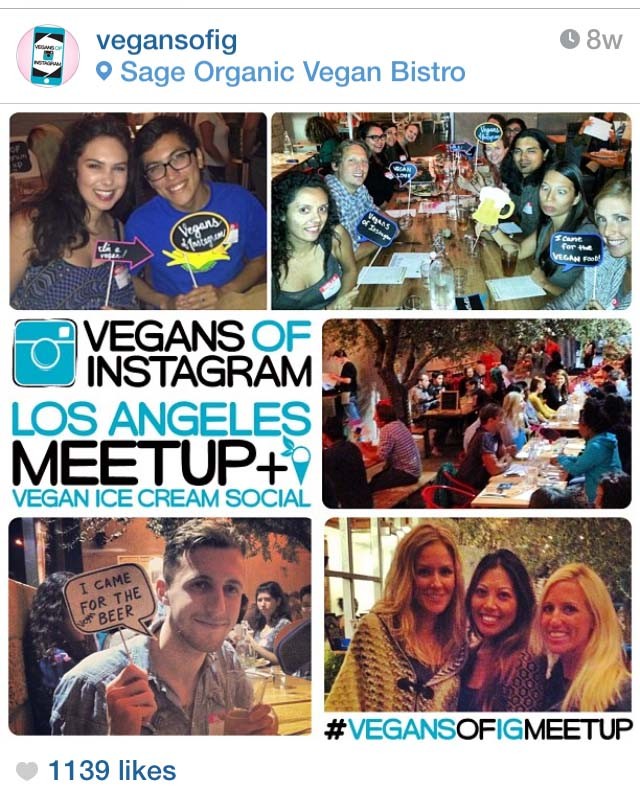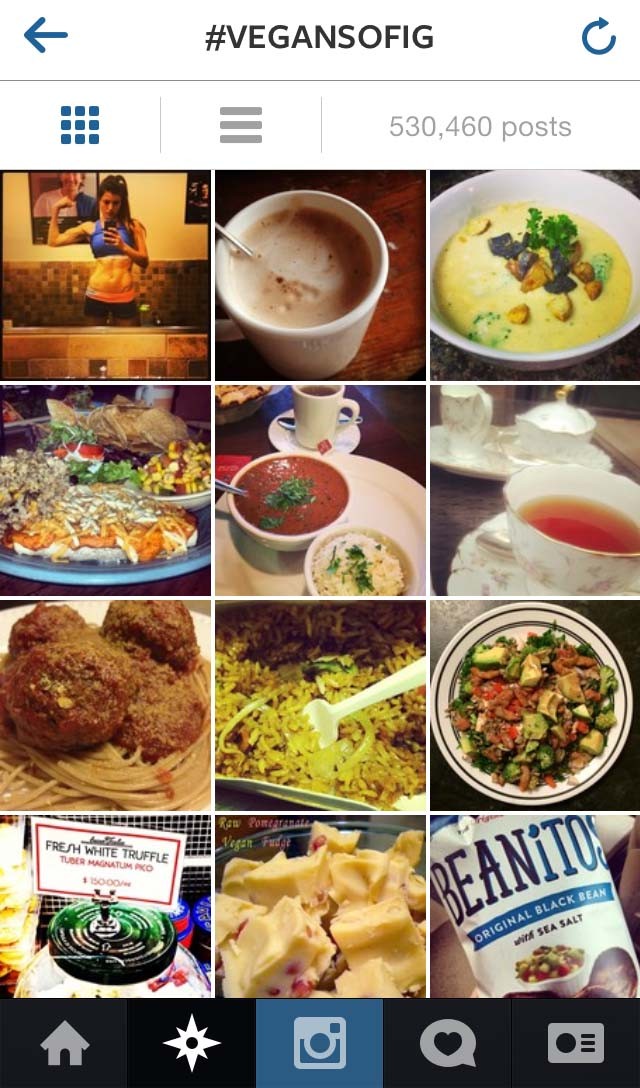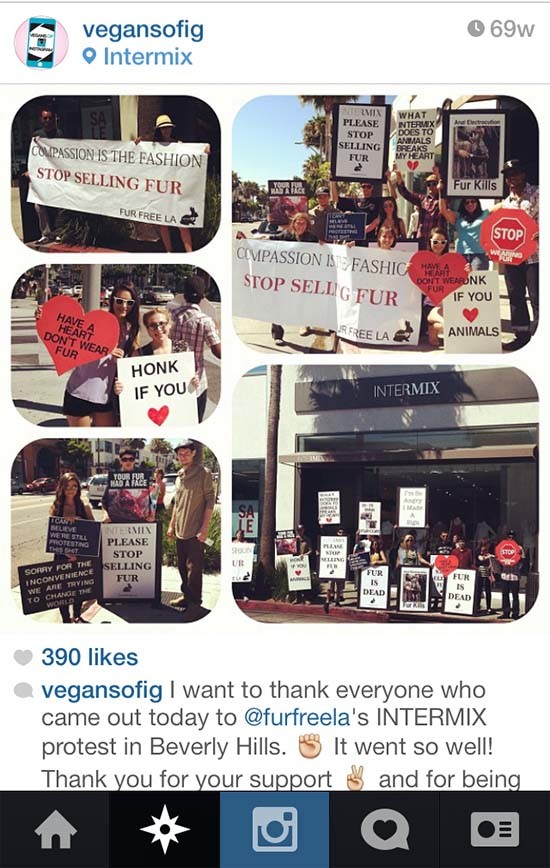
Instagram is a little bit of a food graveyard. It's a regular butt of hipster jokes and home to what might be one of the largest collections of badly-shot food porn in the world, but between the pictures of badly cropped plates and random sunsets, there are a few niche communities.
The fashionable show off their outfits of the day (#ootd), the fit share their exercise tips, and the vegans, well, the vegans share information, shoot food porn, and plan real life meet-ups.
Between fur protests in Los Angeles and social meet-ups in vegan (and veg-friendly) eateries, @VegansofIG account creator Amy Rebecca, the biggest vegan on Instagram, has been busy since April of 2012.
We talked with Amy about the creation and maintenance of this unique community of nearly 40,000 followers.
]

OC Weekly: When did you first get the idea to create a Vegans of Instagram account? Were you on Instagram before you created that account?
Amy Rebecca: I had my personal Instagram account @labellenuage and one for my organization @FurFreeLA before I started @VegansofIG. The Instagram (and vegan) community was a lot smaller prior to the Facebook acquisition and expansion to Android. I noticed there were quite a few vegans using the #vegan and #animalrights tag, but they were all over the place, so I made the @VegansofIG account in effort to bring the vegan Instagram community together. I also wanted a hashtag that only vegans knew about. I was tired of bullies using the #vegan and #peta tag on pictures of meat. So I created the #VegansofIG tag as a safe hashtag to scroll through. Vegans of Instagram started out as a place for vegans by vegans, but the account grew, so did the questions from newbie vegans and veg-curious Instagramers. That's when I began making educational and advice posts. I've talked about everything from how to respond to disapproving omnivores to vegan iron sources. I had no idea the account and the #VegansofIG tag would take off, so it was a huge surprise when it did.
OCW: What's special about Instagram that makes it accessible for veg or veg-curious people?
AR: Instagram supports communities better than any other social network. It's very intimate, yet you still have some control over what you want to share. Plus it's easy to find new vegans through hashtags or friends' accounts. I'd say the majority of friends I've met after college have been from Instagram. I may have more of an advantage since I travel and host vegan meet-ups, but there are Instagramers all over the world that I talk to everyday, and it's pretty amazing that a little app can bring so many people together. When you do meet a fellow vegan that you bond with, it's a much deeper bond than any other friendship. One of my best friends is an omnivore, so it's awkward when she shows off her new leather shoes and asks me what I think. There will always be a slight divide because of our lifestyles. When you connect with a vegan who totally gets you, it's like “Where have you been all my life!”
OCW: You've done lots of educational posts, where you talk about animal rights issues, cruelty-free products, etc. How much time do you usually put into each post? Crafting the image, writing the post, etc.
AR: It really depends on the post. When I first started I would make collages in an iPhone app, but as the account started to grow, I switched over to photoshop for more creative control. When I make an infographic like the images in the “Animal Ingredients Series,” each post can take 5-10 hours in Photoshop. People don't read, so I have to craft each post with the idea that everything I need to say is in the image. Then I have to write the caption. That can be quite tricky because Instagram has a character limit, so I end up having to cut back a lot. When I repost onto Facebook and Tumblr I can squeeze in what I had to leave out, but the one thing I've learned with microblogging is less is more.
[

OCW: What are some unique challenges that you've come across in bringing together the vegan community, with Instagram as the medium? For example, have people gone out of their to be aggressive in the comments section or get into heated arguments? How do you usually deal with that sort of thing? Or do you let it go?
AR: Vegans are often stereotyped as one type of person, but if you group all of us together you'll find that everyone is different. In the same way that every Democrat is different, so are vegans. We have our diet and lifestyle in common, but we all lead different lives. Some vegans are amazing and some vegans are jerks. That's life. I'd say the number one challenge for our community is tactics. Some people feel aggression is the only way to get their opinion across, and many feel the opposite. We're fighting for the same cause, so it's challenging and disappointing when we bicker. That said, I don't feel as though I should have to force myself to like someone just because they're vegan. I stopped responding to trolls and aggressive comments. I have a new policy: forgive, forget, and delete. It's not worth my time to argue with any vegan or omnivore that can't have a reasonable conversation. So I simply ask them to be polite or they'll be blocked. Even if someone makes me really angry, I've got to remember that only someone with no happiness in their life would take the time to make someone else feel bad on the Internet. It's a waste of time to let them get the better of you. No matter how you feel about someone, I believe you should always take the high road.
OCW: You've organized demonstrations and protests through Instagram, especially with Fur Free LA, which you also run. What has your experience with that been like? What are some of the challenges that you've experienced?
AR: The first time I promoted a protest on Instagram I was blown away at how many people showed up. Most of Fur Free LA's army of activists that come out to our demos have been from Instagram. Unlike a Facebook page where people have to find you, you can reach out to other activists in the area. Social media is without a doubt the most important tool in our campaign.The biggest challenge is starting out, but once you gain a following and people know and respect your work, it gets easier.
OCW: You've been on tour now, organizing meet-ups and the like. What's that experience been like? Is there something you've learned about the vegan community that you didn't realize before going on tour around the country? What makes these meet-ups special?
AR: I started hosting vegan meet-ups here in LA, but I kept hearing from vegans in other cities that they wanted a meet-up in their city. So I decided on a whim that I'd go on tour and meet as many people as I could. I had a ton of frequent flyer miles saved up, so I just went for it. So far I've held meet-ups in San Diego, the Bay Area, Portland, Seattle, Boston, Pittsburgh, Chicago, and Phoenix. I have more cities planned for next year. It's been amazing. I was able to meet so many vegans that I had “Insta-crushes” on. I loved that I was able to go to a new city that I otherwise wouldn't know anyone, and meet Instagramers that I've never physically met before, and be able to call them my friends. I try to make my meet-ups as fun as possible. A lot of it is just understanding how people think in social situations and replacing it with an activity so they forget any social anxiety they have. I have photo booth signs and free knick-knacks for everyone. I try to find a fun, hip place with enough space to walk around and mingle. I look for more of a bar atmosphere because I don't want people sitting down. When you're sitting you're closed off, but if you're standing you're open to meet anyone by walking around. My job for the night is to make everyone feel welcome and introduce them so that they can leave the event with new friends. By bringing each city's vegan community together, they can continue to hold meet-ups of their own even after I'm gone. I don't like fame. I don't see myself as any more special than anyone else. For me it's always been about saving animals and uniting this community. I make sure these events are free of product placement. I don't do it to sell anything. It's all about the people. I went vegan back in 2002. I went about 8 years without having any vegan friends. It's tough not having a support system, and I don't want that for other people. I enjoy that I'm not alone in this anymore. Having a community, having vegan friends, it strengthens us and helps our movement grow.
Follow Stick a Fork In It on Twitter @ocweeklyfood or on Facebook! And don't forget to download our free Best Of App here!

